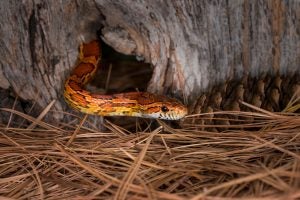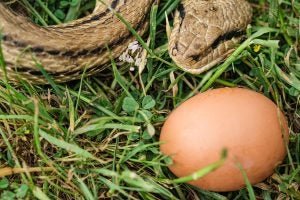If you live on a farm or homestead, you’ve likely wondered about the presence of snakes and what they mean for your land and animals.
In this article, I’ll answer many of the question you have about snakes on the farm: What kinds of snakes you’re likely to find, whether they’re good for farms, some facts and myths, and finally, what to do if one of your livestock is bitten by a snake.
Read on for everything you need to know about encountering snakes on farms!
Types of snakes you’re likely to find on a farm & why
Garter snake
These are one of the most common snakes to find on farms, so much so that people often mispronounce their name as “garden” snakes! They are typically to small to eat rodents, and like to feast on slugs, crickets, earthworms, grasshoppers, and frogs.
Black rat snake
With their long, thick bodies, black rat snakes may look intimidating, however they are completely harmless! They are excellent climbers, and may even make their way to the rafters of your barn to hunt down rats and mice.
Kingsnake
Like rat snakes, kingsnakes like to feed on rodents; unique to this species, however, is their propensity to eat other snakes — especially the venomous ones! Everythingreptiles.com says that “kingsnakes are diurnal, meaning they are active during the day and sleep at night.” This makes kingsnakes a great pet (although you should buy from a reputable breeder or rescue and never try to catch a wild snake)!
Venomous snakes
Both of the snakes in this section are members of the pit viper family; which one you’re most likely to encounter depends on your location in the United States.
In the West and Midwest, your primary concern will be rattlesnakes. In the dryer regions of the West, rattlesnakes are often found on the outskirts of farms, where food and water (from irrigation systems) are likely to be present. Hay bales are often home to large numbers of rats, which is like a buffet for reptile predators.
Along the East Coast, you’re more likely to encounter a copperhead. These snakes, known for their copper-red colored heads, are one of the most commonly seen species in the United States. Like rattlesnakes, they follow their food source and will be attracted to rodents that call your farmland home.

Are snakes good or bad for farms?
Snakes get a bad rep in American culture. They’re usually viewed as creepy, scary, and undesirable to have around. But in truth, snakes are great to have on farms!
Most North American snakes subsist on diets of rodents, insects, and small reptiles, and amphibians. If you’ve never had a rat problem on your farm, you likely have the local snake population to thank.
Rats, mice, and other rodents dig holes in fields and damage crops, while insects such as slugs, aphids, and beetles can carry diseases and even kill entire plants.
All of these pests can be a farmer’s worst nightmare, but snakes help to control these damaging creatures. Without reaching for rat poison or insecticides, which can themselves impact the natural ecosystem, it’s great if you can let the snakes in the area do the exterminator job for you.
Facts & myths about snakes on farms
“I have rabbits, chickens, and other small animals on my farm. I should be worried about snakes eating them!”: FACT (with a few reservations)
- Snakes can pose a danger to your small mammals and fowl. How big of a concern this is depends on the size of your animals — generally speaking, snakes won’t try to eat prey that’s bigger than the thickest part of their body. This leaves most adult animals safer than you might think.
“I should try to capture or kill a snake if I find one on my farm. I don’t want it to bite my family or livestock!”: MYTH
- You should never try to mess with a wild snake. If you meet a snake on your farm, the number one thing to do is to leave it alone. Remain calm and back away slowly, if possible.
- Trying to catch or kill a snake is the best way to get bitten, and even if the snake is nonvenomous, bites can hurt. Teach your family to the same, and you’ll all be safer, as snakes don’t attack humans unprovoked. We’ll get into what to do about livestock in the next section.

How to handle snakebites to livestock
Even though snakes are overwhelmingly good for farms, you do want to be prepared for accidents resulting from snakebites to your livestock.
The anti-venom that is prescribed to humans for venomous snake bites is not usually recommended for livestock; they are too big and would require a massive (and expensive) dose.
Instead, most recommend that you give the animal an antibiotic such as penicillin, oxytetracycline, or ampicillin, and an anti-inflammatory as soon as possible after the bite was sustained.
Always check with your veterinarian if you believe one of your animals has been bitten by a snake.
Summary
Your biggest takeaway from this article should be this: Snakes are great neighbors to have on your farm! Do what you can to protect your family, coop, and livestock from bites, but when you see a snake, it should be cause for joy instead of fear!


